For decades, it was common for families to prepare a formula for young infants using components that could be purchased at the store, such as powdered cow’s milk and sugar. As infant formulas came on the market, it became clear that such mixtures were often nutritionally inadequate and posed substantial danger to infants.
As such, organizations including the Food and Drug Administration and the American Academy of Pediatrics have made it clear that the only alternative to breast milk for infants is an FDA-reviewed commercial infant formula.
Although it is recognized universally that breast milk is better for infants than any alternative, most infants at some point in the first year of life will still receive some formula, and it is critical that this be safe and available.
In Texas, about half of infants receive infant formula via the Special Supplemental Nutrition Program for Women, Infants, and Children (WIC). This program provides most but not all of the infant’s needs. Its widespread adoption has had considerable benefits including a marked decrease in serious health problems for infants such as anemia.
The WIC program is more than just a formula program. It is recognized for providing a range of benefits to families such as lactation support, nutrition for mothers as well as their infants and education related to health. It has bipartisan support and is a global model of success in providing for the needs of infants.
The current government shutdown has led to tremendous concerns about the WIC program and its ability to provide infant formula to families. Although WIC and the related SNAP program have generally been stated to have secure funding through February, there are limited certainties about the availability of all aspects of the WIC program until then.
Already, some families are concerned about whether they may safely be involved in government programs due to immigration concerns, and the shutdown has exacerbated this lack of full utilization of WIC. Pediatricians are hearing about families seeking to go back to homemade formulas or diluting their formula beyond the recommended amount.
This has the potential to be a health disaster. The scientific evidence overwhelmingly makes it clear that the first two years of life are critical for normal brain and cognitive development. Additional risks such as high (or low) blood sodium, inadequate protein in the diet, losing out of omega-3 fatty acids, and contamination with bacteria of homemade or diluted formula exist.
The FDA has a list of over 20 nutrients it regulates in infant formula to be sure nothing is missing or inadequate. As infants in the first months of life obtain all of their nutrition from breast milk or formula, even small errors can be deadly to an infant.
So, what is to be done? Ending the shutdown is an obvious solution, but beyond that we must be sure that education is available at WIC offices, community health centers and elsewhere to ensure that families have an understanding of the need to not make their formula at home or overdilute it.
Advocacy and support for breastfeeding mothers, including needed policies to support working mothers such as available time and proper location to store and pump their milk, are urgently needed. Greater awareness of the challenges of breastfeeding for working mothers with workplace and lactation support interventions will have substantial benefits for children and families.
There is no second chance at infant nutrition and infant brain development. Even a few weeks of inadequate infant nutrition can harm an entire life. Communities need to band together to identify at-risk families and ensure that they have an adequate supply of infant formula as needed. It is not enough to hope the shutdown ends before the formula supply does. Public education about the critical need to obtain and prepare infant formula as directed and support for breastfeeding families should be ensured for every family in Texas.
Steven A. Abrams, M.D., is a professor of pediatrics at Dell Medical School at The University of Texas at Austin.
A version of this op-ed appeared in the Dallas Morning News, Austin American Statesman and the Houston Chronicle.




